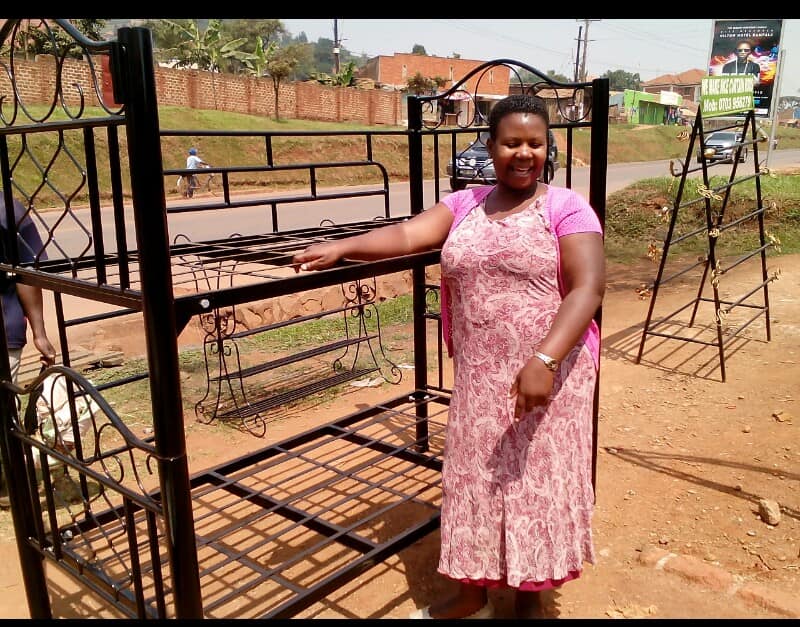For 44-year old Ugandan, Jane Werikhe, making the transition from teaching to the male-dominated metal-welding industry has been far from seamless but not only has she survived after seven years. She has also thrived.
The affable mother of four, owns a welding and metal fabrication workshop along Entebbe road in the suburbs of Kampala.
She had left her teaching job where she was earning $29 monthly for the fabrication business which she has managed to find better pay.
Since going into welding in 2013, Ms. Werikhe has never looked back.
At her workshop she hires six men and a lady to make sofa chairs, beds, flower vests, and handbag racks among other household things in demand by clients.
The beds at her workshop are sold at a minimum of $148, fetching her a minimum profit of about $48 per bed.
Ms. Werikhe sells her products through social media adverting and it is through this that many have come to appreciate her work.
The Genesis
Mrs. Werikhe tells the African Press Agency that she had to sell her car for $2380 to start her workshop.
The car had been given to her by her husband after the birth of their first baby but she had no other source of funds to start the workshop.
Selling off the car to raise the money was her only available option.
Even with the benefit of hindsight, Werikhe says she does not regret selling her car to start her welding business.
“The benefits from this profession can fetch me as many cars as I want” she adds.
Werikhe says whenever she meets people the question is always how as a woman she manage to survive and even thrive in a male dominated job.
“My answer is always that women should always learn to partner with others and also stop looking down on or overlooking jobs” she says, her cheeks wrinkled into a shy smile.
She grew up with a belief that there is no boundary over what women and men can or cannot do.
Through the course of the interview, Ms. Werikhe is busy dusting the rust off the metals and smoothening the edges of other finished products waiting for a coat of paint.
Stereotypical challenges
Werikhe says her main challenge is the erratic power supply at her workshop as well as the high electricity tariffs in Uganda.
“Sometimes power goes off for the whole day and a bid or order and business is lost” Werikhe remarked ruefully.
She says like many other Ugandan businesses that stalled following the war in South Sudan, hers was also hit by a setback.
She used to export most of her products to clients in South Sudan, a business which fetched her a higher price than what she obtains from selling them in Uganda.
She also finds it difficult to convince men to buy metal fabrications from a woman’s workshop.
Expansion
Werikhe has used her metal fabrication business to set up a stationary business from which she earns a supplementary income.
She has also helped her husband to buy a plot of land where they plan to build a family home.
Mrs. Werikhe is now planning to buy her own fleet of trucks to use while transporting her clients’ orders.
It is currently costly for her to hire cars for transportation.
She also plans to open up showrooms in other parts of the country and across East Africa.
Advice to fellow women and government
Mrs. Werikhe advises women to look beyond professional jobs by virtue of their degrees or other academic qualifications but hit the ground running with practical trades.
“I did not get the attention I am getting today during those early days when I was a teacher. Today I have attracted attention from local and international media interested in my story as a metal fabricator. Can you imagine I even receive orders from government ministries, departments and NGOs” Ms. Werikhe explains.
She calls on the Ugandan government to put more emphasis on teaching practical skills instead of encouraging its citizens to pursue theories in schools that may not be very effective outside the classroom.
“It pays for society to see more and more women and girls acquiring skills for trades that are male dominated.
Werikhe says society should also break those taboos that ring fence particular jobs for the males and stereotype women as a weak gender meant for “soft jobs”.
CN/as/APA


